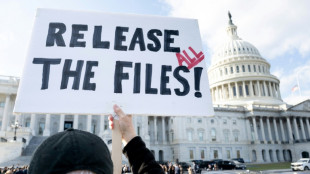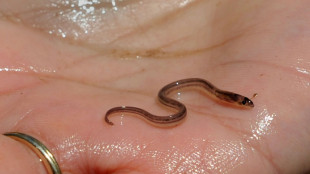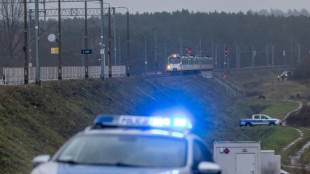
-
 US lawmakers set for explosive vote on Epstein files
US lawmakers set for explosive vote on Epstein files
-
Gianfranco Rosi: the slow documentary maker in a frantic world

-
 P.Priime, Nigeria's young leading Afrobeats producer
P.Priime, Nigeria's young leading Afrobeats producer
-
Merz, Macron to push for European digital 'sovereignty'

-
 Trump hosts Saudi prince for first time since Khashoggi killing
Trump hosts Saudi prince for first time since Khashoggi killing
-
Tonga's Katoa out of NRL season after brain surgery

-
 Japan warns citizens in China over safety amid Taiwan row
Japan warns citizens in China over safety amid Taiwan row
-
In Somalia, a shaky front line barely holds back the 'dogs of war'

-
 Shares in 'Baby Shark' studio jump on market debut
Shares in 'Baby Shark' studio jump on market debut
-
Thunder breeze past Pelicans, Pistons overpower Pacers

-
 Grieving Cowboys remember Kneeland, defeat Raiders
Grieving Cowboys remember Kneeland, defeat Raiders
-
Loaf behind bars: Aussie inmate says Vegemite a human right

-
 In film's second act, 'Wicked' goes beyond Broadway musical
In film's second act, 'Wicked' goes beyond Broadway musical
-
Asian markets track Wall St down with Nvidia, US jobs in view

-
 Scott Boland: the best 'spare' fast bowler around
Scott Boland: the best 'spare' fast bowler around
-
Fire and Ashes: England bank on fast bowling barrage in Australia

-
 North Korea says Seoul-US sub deal will trigger 'nuclear domino' effect
North Korea says Seoul-US sub deal will trigger 'nuclear domino' effect
-
Education for girls hit hard by India's drying wells

-
 Haitian gangs getting rich off murky market for baby eels
Haitian gangs getting rich off murky market for baby eels
-
Trump says will talk to Venezuela's Maduro, 'OK' with US strikes on Mexico

-
 Oscar Piastri wins Australia's top sports honour
Oscar Piastri wins Australia's top sports honour
-
'Severely restricted': Russia's Saint Petersburg faces cultural crackdown

-
 Polish PM denounces 'sabotage' of railway supply line to Ukraine
Polish PM denounces 'sabotage' of railway supply line to Ukraine
-
UK toughens asylum system with radical overhaul

-
 Carney's Liberals pass budget, avoiding snap Canada election
Carney's Liberals pass budget, avoiding snap Canada election
-
LeBron back in training, edges closer to Lakers return

-
 Climate talks run into night as COP30 hosts seek breakthrough
Climate talks run into night as COP30 hosts seek breakthrough
-
Germany and Netherlands lock up World Cup spots in style

-
 Germany's Woltemade hopes for 2026 World Cup spot after scoring again
Germany's Woltemade hopes for 2026 World Cup spot after scoring again
-
Germany 'send message' with Slovakia rout to reach 2026 World Cup

-
 Trump unveils fast-track visas for World Cup ticket holders
Trump unveils fast-track visas for World Cup ticket holders
-
Netherlands qualify for World Cup, Poland in play-offs

-
 Germany crush Slovakia to qualify for 2026 World Cup
Germany crush Slovakia to qualify for 2026 World Cup
-
Stocks gloomy on earnings and tech jitters, US rate worries

-
 'In it to win it': Australia doubles down on climate hosting bid
'In it to win it': Australia doubles down on climate hosting bid
-
Former NFL star Brown could face 30 yrs jail for shooting case: prosecutor

-
 Fate of Canada government hinges on tight budget vote
Fate of Canada government hinges on tight budget vote
-
New research measures how much plastic is lethal for marine life

-
 Mbappe, PSG face off in multi-million lawsuit
Mbappe, PSG face off in multi-million lawsuit
-
EU defends carbon tax as ministers take over COP30 negotiations

-
 McCartney to release silent AI protest song
McCartney to release silent AI protest song
-
Stocks tepid on uncertainty over earnings, tech rally, US rates

-
 Louvre shuts gallery over ceiling safety fears
Louvre shuts gallery over ceiling safety fears
-
'Stranded, stressed' giraffes in Kenya relocated as habitats encroached

-
 US Supreme Court to hear migrant asylum claim case
US Supreme Court to hear migrant asylum claim case
-
Western aid cuts could cause 22.6 million deaths, researchers say

-
 Clarke hails Scotland 'legends' ahead of crunch World Cup qualifier
Clarke hails Scotland 'legends' ahead of crunch World Cup qualifier
-
S.Africa says 'suspicious' flights from Israel show 'agenda to cleanse Palestinians'

-
 South Korea pledges to phase out coal plants at COP30
South Korea pledges to phase out coal plants at COP30
-
Ex-PSG footballer Hamraoui claims 3.5m euros damages against club


'Flower Moon' descendants feel pain of murdered Osage ancestors
As eagles swoop overhead and a cool autumnal wind blows through the cemetery in Gray Horse, on the ancient lands of the Osage people in northern Oklahoma, Margie Burkhart points to the tombs of ancestors murdered a century ago.
The tragedy that struck her family is at the heart of the new Martin Scorsese film "Killers of the Flower Moon," taken from the best-selling book of the same name.
In the 1920s, Mollie Burkhart, Margie's grandmother -- played in the film by Native American actress Lily Gladstone -- saw her mother, her sisters and her brother-in-law murdered.
The killings came one after another -- in a poisoning, in a bombing, by a bullet to the head.
"I think they systematically chose which ones to die," 61-year-old Margie Burkhart told AFP.
Intensifying the ordeal even further: The killings were orchestrated by Mollie's own husband, Ernest Burkhart, played by Leonardo DiCaprio, and his uncle William Hale (Robert De Niro) -- two white settlers intent on getting their hands on the Osage family's rights to their oil-rich property.
- 'Just for greed' -
Today, the yellowing fields around Gray Horse are dotted with the occasional oil rig -- but this is nothing compared to the huge boom at the turn of the 20th century, when the huge machinery covered the prairies for miles around.
That's when one of the most prolific oil fields in the US at the time was discovered on the Osage reservation.
The Osage people held the exclusive rights to exploiting this underground wealth -- rights that legally could only be transferred to or inherited by an Osage member's legal heir.
"The Osages were considered the wealthiest people in the world," said Kathryn Red Corn, who is Osage, speaking in a house built by her great-grandfather in Pawhuska, the seat of the Osage nation's current government.
That wealth drew the attention of some nefarious white settlers.
People came to the area and wooed and married members of the Osage nation for their money, said the 82-year-old Red Corn.
"They would have them murdered, and then they would inherit what they had," she said. The walls of her living room are decorated with Osage art and black-and-white photos of her ancestors.
In all, at least 60 members of the Osage nation -- many more by some estimates -- were believed murdered during a period that became known as the Reign of Terror.
- Suspicious poisoning -
Red Corn's grandfather, Raymond Red Corn Senior, who was also Osage, suspected his second wife, a white woman, of poisoning him.
He died suddenly in his 40s and in otherwise good health, Kathryn Red Corn said. His death, in the early 1920s, was never investigated.
For Margie Burkhart, the sense of anger and suffering around these murders are still palpable -- feelings reawakened this summer when she attended a private screening of Scorsese's film.
"They took away my (great-)aunties, and I could have had a big family," she said, almost choking on the words. "I could have had a lot of cousins, nieces, nephews -- and I grew up without them."
She added: "William Hale didn't have to do that," she said of one of the masterminds of the killings. "He was one of the richest people in Osage County."
"It was just for greed. He wanted more money."
- 'No justice' -
"Simply because they were Indian, their life had lesser value," lamented 62-year-old Jim Gray, a former principal chief of the Osage nation.
He said his great-grandfather Henry Roan was murdered in 1923, also in a plot organized by Hale, who had taken out a life insurance policy in Roan's name.
Both Ernest Burkhart and Hale were eventually convicted of murder -- despite their efforts at a cover-up -- and received life sentences.
Gray said only a small percentage of the Osage murders in this period were investigated by federal authorities.
"These stories have not been told," he said in the small town of Skiatook, north of Tulsa. "There's been no justice for those families."
Gray was deeply concerned when he heard that Hollywood had taken an interest in this painful chapter of Osage history.
"Were we just going to be second-tier characters in our own story?" he wondered.
Instead, Gray said, "Imagine our surprise when Scorsese reached out and met with us, and listened to us, and effectively rewrote big portions of the script."
Having originally focused on the federal investigation, writers reworked the script to center on the story of Mollie and Ernest Burkhart.
"You're going to watch this film and the Osage influence, you're going to be able to feel it," Gray said.
He hopes the film's October 20 US release will spark debate about "the people that were stepped on" to make the country "what it is today."
Gray added: "People may not want to talk about it. It's not in our history books."
But, he went on, "We need to know our past, especially the mistakes... so that we won't repeat them."
Margie Burkhart also hopes the film keeps memories of the Osage's searing trauma from dimming into oblivion.
"In two, three years from now, when the movie fades away, I hope people are still talking about it," she said.
J.AbuHassan--SF-PST




